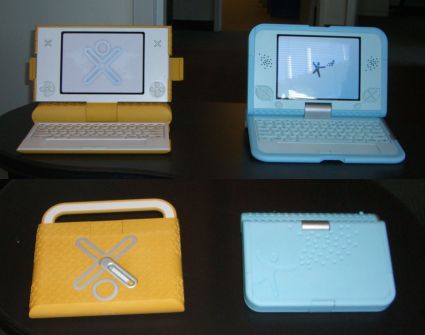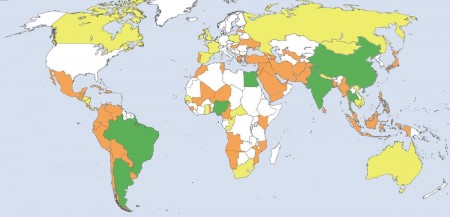Here’s the latest look/feel of the $100 computer (One Laptop Per Child) that I’ve written about before.

This follows close on the heels of my latest post on how technology can help change Africa – on purpose. Imagine 20,000 Ugandan kids running around with these. Networking with each other, learning to hack and program and generally changing the way Africans interact with computers.
The map below represents the countries where they plan to pilot (green), the countries that have expressed an interest at the Ministry-of-Education level or higher (orange), or that are interested but still seeking government support (yellow). I’m glad to see Africa represented, but I would really like to see the whole map of Africa colored. That would at least mean that the African nations are paying lip-service to the idea.

March 6, 2006 at 4:30 am
What does all the blue represent? That’s a pretty big market to not have a share in this, don’t you think?
March 6, 2006 at 8:35 am
I am rather surprised to see a large chunk of western europe, Canada and Australia in yellow. I really hope that these countries don’t get a head start on African countries and then see African countries being left out because of supply, availability, or other logistical issues. Its not that I want to deny kids in those countries a laptop but in those countries there are several other avenues whereby affordable laptops can be acquired and I thought the whole idea of One laptop per child was to assist disadvantaged countries.
March 6, 2006 at 12:45 pm
Good point Thakadu. I’m interested in seeing if more of the 3rd world country governments will get on board too. I’d be surprised if the supply issue really became a problem though. I actually would think of it as a benefit – the greater the demand, the cheaper they can make them due to economies of scale.
March 6, 2006 at 12:57 pm
> the greater the demand, the cheaper they can make them due to economies of scale.
Quite correct and I seem to recall reading somewhere that to get down to the $100 price tag, countries would be required to buy a minimum of 1 million laptops. $100 million is quite a hefty outlay for some of the smaller, poorer countries that need them the most. In Botswana for example there arn’t even 1 million students so they would already presumably not qualify, unless they formed cartels with other small (in population) countries. This of course would introduce some beurocratic issues to overcome while for countries like Australia and Canada, $100 million is probably a small part of their education budget.
March 6, 2006 at 6:44 pm
A real cock-a-maimy idea.
Providing $100 computers for children seems like a good idea, but then as one digs deeper into the project, it stinks. The groups web page says the units will not be for sale, but only distributed through “large government initiatives.” Mistake number one. These are the last people concerned with a project like this. Small plastic units, if they get produced and distributed, will only pollute our environment with more plastic garbage when these units become unusable, as they likely will in the bush of Africa or the deserts of the world, to be discarded where one stands.
This project feels like it was developed by a politician; not for anything positive other than the ego of the politician. This is a wasted effort on a no-good project for a no-good idea. Spend your money elsewhere and leave private enterprise to develop what our world needs, which is other than a $100 computer.
March 6, 2006 at 8:58 pm
Jimmy, a little different assessment than I had of the situation. First off, I completely agree that private enterprise is better able to deal with problems than governments. I understand however, that in order for this program to work (as a program anyway) is to get the governments buy-in. Also, in order for the big companies to take part (Google, AMD, etc…) they needed to have a big plan with big news potential – therefore the government strategy. Anyway, that’s my take on it so far.
I too thought that the small plastic computers might meet their doom quite quickly in rough places like Africa. Since I don’t know your experience with Africa, or third-world countries at all, I’ll just explain what I know.
If you have ever visited the bush country of Africa, you’ll find people with their highly prized radios (cell phones now too). If those precious pieces of technology are broken you would be surprised at the extent of ingenutiy Africans have to fix things. In fact, Kenyans in particular are so good at it that a whole economy has grown up around what is called the Jua Kali – fixers and creators of things. Basically, I understand your hesitation, but I differ in opinion on what the outcome will be.
August 14, 2007 at 10:23 am
Will someone please advise me if the school-age children of the United States of America whose parents are below the poverty level will be offered a computer so that they can reap the same benefits given to the children of foreign countries.
Thank you.